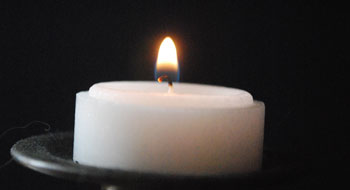Second grader scientists report giant puddle is nearly knee deep. [photo]
Stories indexed with the term ‘science’
Milestone: The Science of Journalism
Editor’s note: The monthly milestone column, which appears on the second day of each month – the anniversary of The Ann Arbor Chronicle’s Sept. 2, 2008 launch – is an opportunity for either the publisher or the editor of The Chronicle to touch base with readers on topics related to this publication. It’s also a time that we highlight, with gratitude, our local advertisers, and ask readers to consider subscribing voluntarily to The Chronicle to support our work.
Description. Analysis. Explanation. Remember those three concepts.
Last month I participated in a video teleconference with students who are members of Bowling Green State University’s Online News Association. It’s a group that’s advised by department of journalism and public relations faculty member Dave Sennerud. The focus that evening was on hyperlocal news sites, which is a specialty of BGSU’s Mike Horning. Horning recently completed a dissertation on that topic at Penn State University.
I view any interaction like that video conference as a chance to evangelize a bit about The Chronicle’s approach to writing the news – which prioritizes description over storytelling. And that chance came when a general question was posed about advice to journalism majors who will be entering the field.
My advice: Got a journalism degree? That’s great, but I’d prefer that you were a scientist.
As we used to say back in Indiana, that is currently a mute point. Right now, although the amount of advertising and individual subscriber support continues to increase each month, not enough readers subscribe voluntarily and not enough advertisers purchase ads for us to contemplate hiring additional full-time staff. But that’s the direction we’re working towards, to supplement our freelance reporters and to make our own workload more sustainable.
So while we’re not in a hiring mode now, we do anticipate a time when we’ll be making those decisions, and it makes sense to think about the type of skills we’d like a reporter to have.
The main skill a Chronicle reporter needs – and the one I think the entire field of journalism has largely forgotten – is the ability to describe, in detail, an event or an issue in a way that is designed mostly to engage the intellect of readers, not their emotions. It’s actually a scientific skill. But that approach to writing the news contrasts with the way institutional journalism has evolved to train its next generation of practitioners.
If basic description is a part of traditional, institutional journalism, it’s typically well-hidden, behind attempted analysis and attempted explanation – in the form of “stories.” And when I write the word “stories,” I put those scare quotes around it consciously. That’s so it’s not confused with other ways of referring to items that might appear in a journalistic publication, like “articles,” “briefs” or “reports.”
Most items that are written by traditional journalists these days are attempts at “stories” in that term’s literal sense – a narrative with a conflict, a plot, and characters who say interesting and provocative things. But as a reporter, if you begin with the idea of a story you want to tell, you’ve ordered your task backwards. [Full Story]




